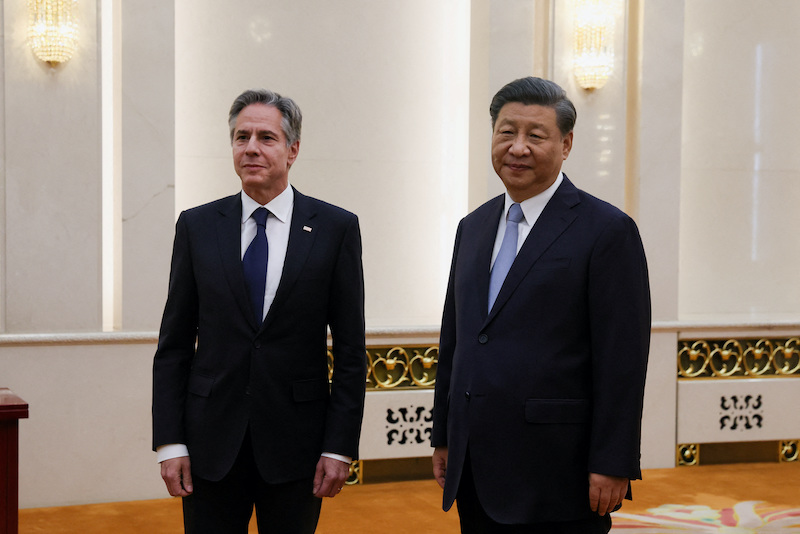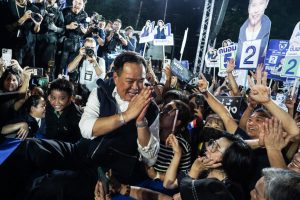President Xi Jinping put a positive spin on China’s talks with US Secretary of State Antony Blinken in Beijing on Monday.
The Chinese leader hailed “progress” on the latest Sino-US get together, although observers said earlier that little progress appeared to have been made over many hours of discussions on Sunday and Monday.
Blinken met with Xi Jinping late on Monday afternoon in the Great Hall of the People, as his much-watched visit to Beijing was set to wrap up.
The first Secretary of State to meet the Chinese leader in five years, Blinken strode towards Xi with his hand outstretched as Xi stood to greet him.
The two delegations later faced each other across a long conference table bedecked with pink lotus flowers, with Xi at the head and Blinken just to his right. Their meeting lasted just over half an hour, the State Department said.
Also on AF: China Says the US is Creating an Illusion It’s Keen to Engage
Xi says agreement on some issues ‘very good’
The meeting, on the final day of Blinken’s two-day visit, could help to facilitate a summit between Xi and US President Joe Biden later this year – which some analysts say Xi may be keen to undertake, given the Chinese economy’s precarious slump in recent months.
Biden and Xi last met on the sidelines of the G20 summit in Indonesia in November, pledging more frequent communication, although ties since then have deteriorated over issues ranging from Taiwan to espionage concerns.
At the start of the meeting, Xi said Chinese and US officials had had candid and in-depth discussions.
“The two sides agreed to follow through the common understandings President Biden and I had reached in Bali. The two sides have also made progress and reached agreement on some specific issues. This is very good,” Xi said in a video posted online by Chinese state television.
“I hope that through this visit, Mr Secretary, you will make more positive contributions to stabilizing China-US relations,” Xi added, addressing Blinken.
But little progress seen on differences
It was not immediately clear from Xi’s remarks or previous readouts of Blinken’s earlier discussions with China’s top diplomat Wang Yi on Monday and foreign minister Qin Gang on Sunday, exactly what progress had been made.
Earlier, Blinken held several hours talks on Monday with top diplomat Wang Yi, after long and extensive discussions with Foreign Minister Qin Gang on Sunday.
The trip was aimed at ensuring the many disputes between the superpowers do not spiral into conflict. But expectations appeared to be low on both sides, observers said.
But the talks, held at the Diaoyutai state guest house in Beijing, did not appear to make much progress in bridging the two sides’ differences on issues ranging from Taiwan to trade, human rights, stemming the flow of synthetic opioid fentanyl or their approach to the war in Ukraine.
Blinken underscored the importance of open communication channels to manage their competition during more than three hours of talks with Wang, which the State Department called “productive.”
Wang Yi, who described US-China relationship as being at a low point, said the root cause was the United States’ wrong perception of China.
“We must take a responsible attitude toward the people, history and the world, and reverse the downward spiral of US-China relations,” Wang said during the meeting with Blinken, according to a statement released by China’s foreign ministry.
Wang urged the US to stop speculating on threats from China, abandon its “suppression” of China’s scientific and technological development, and refrain from interfering in its internal affairs, according to Chinese state media.
The lack of regular and open communication channels between the world’s top two economies has sent jitters around the world. Beijing’s reluctance to engage in regular military-to-military talks with Washington has alarmed China’s neighbours.
Decision to boost flights
During seven and a half hours of talks with Qin on Sunday, Blinken stressed “the need to reduce the risk of misperception and miscalculation”, the State Department said.
Both sides emphasized the importance of making it easier for their citizens to visit, and agreed on working to increase passenger flights, which boosted Chinese airline shares.
They also expressed a desire to stabilise bilateral ties despite what one US official called their “profound” differences, and agreed that Qin would visit Washington to continue the conversation, though no date was announced.
“This is going to be a process of sustained diplomacy,” one senior State Department official, speaking on the condition of anonymity, said on Sunday.
Blinken’s trip, which was postponed in February after a suspected Chinese spy balloon flew over US airspace, is closely followed worldwide as further deterioration of ties between the world’s two largest economies could have global implications on financial markets, trade practices and routes and supply chains.
Wang: ‘No compromise on Taiwan’
Beijing’s tone on Taiwan, the democratic island Beijing claims as it own, has been particularly pointed throughout Blinken’s visit. Wang said “China has no room for compromise or concessions”, according to the Chinese readout.
The United States has long stuck to a policy of “strategic ambiguity” over whether it would respond militarily to an attack on Taiwan, which Beijing has refused to rule out.
When asked last year, US President Joe Biden said Washington would defend Taiwan in the event of a Chinese invasion, though aides later said his comments did not reflect a policy departure from the long-standing “one China” policy.
US officials have underscored that the United States does not support Taiwan independence.
The Chinese readout of Sunday’s meetings described them as constructive but made clear that Taiwan is the most important issue, and a potentially dangerous one.
“Qin Gang pointed out that the Taiwan issue is the core of China’s core interests, the most important issue in Sino-US relations, and the most prominent risk,” Chinese state media quoted Qin as having told the top US diplomat.
US officials have been playing down the prospect of a major breakthrough in talks, but they and analysts expect Blinken’s visit will pave the way for more bilateral meetings in coming months, including possible trips by Treasury Secretary Janet Yellen and Commerce Secretary Gina Raimondo.
Biden and Xi held long-awaited first face-to-face talks on the sidelines of a summit of the Group of 20 big economies in November on the Indonesian island of Bali, engaging in blunt talks over Taiwan and North Korea but also pledging more frequent communication, although ties since then have deteriorated.
- Reuters with additional reporting and editing by Jim Pollard
NOTE: This headline, photo and content in this report was amended on June 19, 2023 as further details arrived.
ALSO SEE:
China Warning on ‘Vicious Competition’ As Blinken Flies to Beijing
China Warns US to Stop Interfering in Call Ahead of Blinken Trip
China Has Been Spying From Cuba For Years, US Says
World Big Enough for China And US, Says Beijing’s Defence Chief
China Stages Military Drills Around Taiwan Over Tsai’s US Trip
























